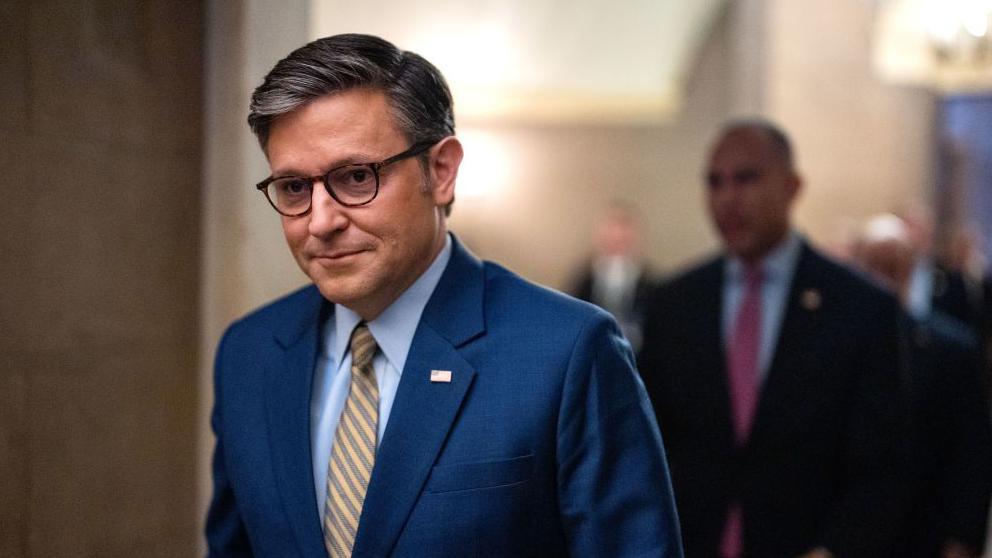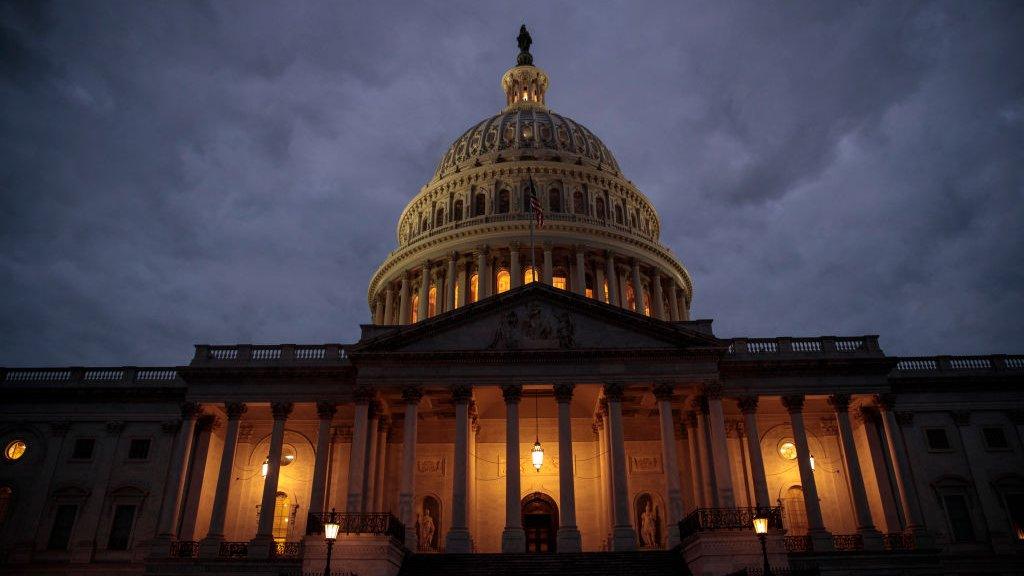Congress in disarray and shutdown looms as Trump, Musk slam spending deal

Speaker of the House Mike Johnson has defended the 1,500 page stopgap bill
- Published
The US could face a government shutdown at midnight on Saturday after President-elect Donald Trump called on Republican lawmakers to reject a bipartisan funding bill that would have kept the government funded through March.
Trump urged Congress to scrap the deal and pass a slimmer version with fewer provisions. His intervention followed heavy criticism of the bill by tech billionaire Elon Musk.
Congressman Steve Scalise, the Republican House Majority Leader, indicated on Wednesday night that the bill was dead after Trump denounced it.
The short-term funding bill will need to be passed by Congress by the end of week to prevent federal government offices from shuttering beginning on Saturday.
Now, Republican leadership must go back to the drawing board, and they only have until 23:59 EDT (04:59 GMT) to reach a deal before funding expires and the government shuts down.
A government shutdown would cause federal services - ranging from the National Park Service to Border Patrol - to limit and begin closing operations this weekend.
Trump and Vice-President-elect JD Vance dealt the final blow to House Speaker Mike Johnson's bipartisan funding bill on Wednesday night following a pressure campaign led by Mr Musk on X.
Mr Musk, who Trump has tasked with cutting government spending in his future administration, lobbied heavily against the existing deal posting repeatedly on Wednesday against the bill, often with false statements.
The president and vice-president elect are pushing for streamlined legislation that does not include Democratic-backed provisions that Johnson negotiated with his colleagues across the aisle.
The now-dead bipartisan deal would have extended government funding until March 14 - several months after Trump returns to the White House.
The legislation is necessary because Congress never passed a budget for the 2025 fiscal year, which began on 1 October. Instead, lawmakers opted to pass a short-term funding extension until December 20.
They also called, in a joint statement, for Congress to raise the debt ceiling, which determines how much the government can borrow to pay its bills, and limit the funding legislation to temporary spending and disaster relief.
"Republicans want to support our farmers, pay for disaster relief, and set our country up for success in 2025. The only way to do that is with a temporary funding bill WITHOUT DEMOCRAT GIVEAWAYS combined with an increase in the debt ceiling," the statement read.
They called anything else "a betrayal of our country."
In posts on his social media site, Truth Social, Trump threatened to help unseat "any Republican that would be so stupid as to" vote in favour of the current version of the bill, which was unveiled on Tuesday.
"If Democrats threaten to shut down the government unless we give them everything they want, then CALL THEIR BLUFF," he said.
Johnson's 1,500-page continuing resolution included more than $110bn (£88bn) in emergency disaster relief and $30bn (£23bn) in aid to farmers. It also included the first pay raise for lawmakers since 2009, federal funds to rebuild a bridge that collapsed in Baltimore, healthcare reforms, and provisions aimed at preventing hotels and live event venues from deceptive advertising.
It is not clear how Johnson plans to proceed. Both parties are meeting on Thursday to decide their party's path forward.
Democrats are unlikely to help Johnson with support for a re-vamped funding bill, blaming him for breaking their bipartisan agreement.
"You break the bipartisan agreement, you own the consequences that follow," Democratic House Minority Leader Hakeem Jeffries posted on X.
White House Press Secretary Karine Jean-Pierre issued a statement after Trump came out against the bill, saying: "Republicans need to stop playing politics with this bipartisan agreement or they will hurt hardworking Americans and create instability across the country."
"Triggering a damaging government shutdown would hurt families," President Joe Biden's spokeswoman continued, adding: "A deal is a deal. Republicans should keep their word."
There have been 21 US government shutdowns or partial shutdowns over the past five decades - the longest of which was during Trump's first term when the government was shuttered for 35 days.
Watch: How does a government shutdown impact the US?
Related topics
- Published9 March 2024
